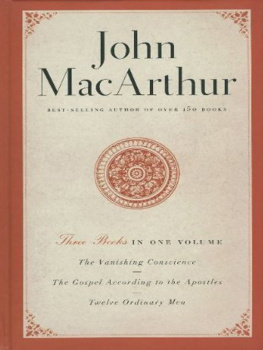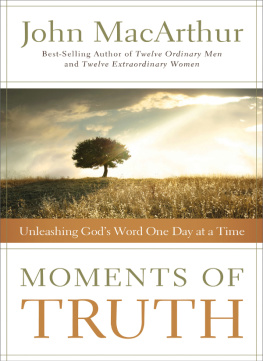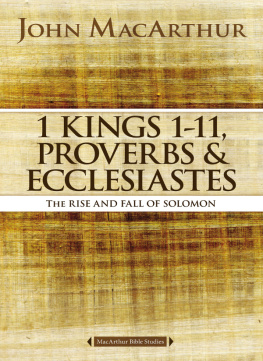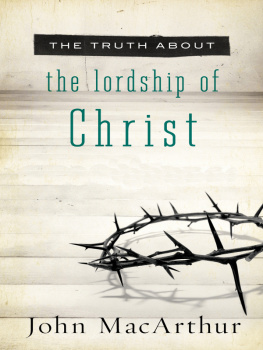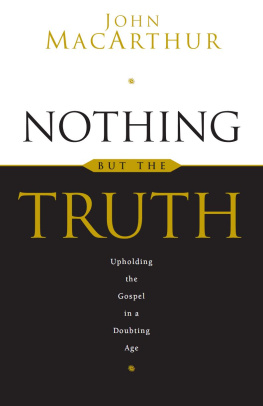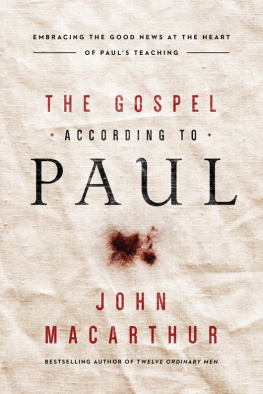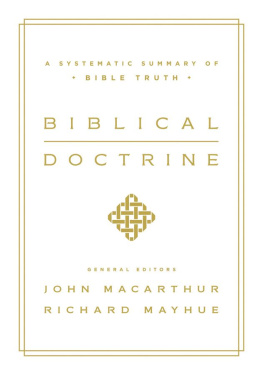THE
VANISHING
CONSCIENCE
THE GOSPEL
ACCORDING TO THE
APOSTLES
TWELVE ORDINARY MEN
OTHER BOOKS BY JOHN MACARTHUR
Twelve Extraordinary Women
Hard to Believe
The Book on Leadership
The Battle for the Beginning
God in the Manger
The God Who Loves
The Gospel According to the Apostles
How to Survive in a World of Unbelievers
Introduction to Biblical Counseling
The Murder of Jesus
Rediscovering Expository Preaching
Rediscovering Pastoral Ministry
Terrorism, Jihad, and the Bible
The Vanishing Conscience
Whose Money Is It,Anyway?
Why Government Cant Save You
Why One Way?
BIBLE PRODUCTS BY JOHN MACARTHUR
Biblical Parenting for Life Study
MacArthur Bible Studies
MacArthurs Quick Reference Guide to the Bible
The MacArthur Student Bible
The MacArthur Study Bible (New King James Version)
THE
VANISHING
CONSCIENCE
THE GOSPEL
ACCORDING TO THE
APOSTLES
TWELVE ORDINARY MEN
JOHN MACARTHUR

The Vanishing Conscience 1994 and 1995 by John F. MacArthur, Jr.
The Gospel According to the Apostles 1993 and 2000 by John F. MacArthur, Jr.
Twelve Ordinary Men 2002 by John MacArthur
All rights reserved. No portion of this book may be reproduced, stored in a retrieval system, or transmitted in any form or by any meanselectronic, mechanical, photocopy, recording, scanning, or otherexcept for brief quotations in critical reviews or articles, without the prior written permission of the publisher.
Published in Nashville, Tennessee, by Thomas Nelson. Thomas Nelson is a registered trademark of Thomas Nelson, Inc.
Thomas Nelson, Inc., titles may be purchased in bulk for educational, business, fund-raising, or sales promotional use. For information, please e-mail SpecialMarkets@ThomasNelson.com.
Unless otherwise noted, Scripture quotations in The Vanishing Conscience and The Gospel According to the Apostles are taken from the NEW AMERICAN STANDARD BIBLE. The Lockman Foundation 1960, 1962, 1963, 1968, 1971, 1972, 1973, 1975, 1977. Used by permission.
Unless otherwise noted, Scripture quotations in Twelve Ordinary Men are taken from the NEW KING JAMES VERSION. 1982 by Thomas Nelson, Inc. Used by permission. All rights reserved.
Scripture quotations marked KJV are taken from THE KING JAMES VERSION.
Scripture quotations marked NASB are taken from the NEW AMERICAN STANDARD BIBLE. The Lockman Foundation 1960, 1962, 1963, 1968, 1971, 1972, 1973, 1975, 1977, 1995. Used by permission.
Scripture quotations marked NIV are taken from the HOLY BIBLE: NEW INTERNATIONAL VERSION. 1973, 1978, 1984, by International Bible Society. Used by permission of Zondervan Publishing House. All rights reserved.
Library of Congress Cataloging-in-Publication Data
ISBN: 978-1-4002-8021-6
THE
VANISHING
CONSCIENCE
To Al Sanders
with gratitude for half a century
of loyal service to the Savior
and thanks for many years
as a wise and generous friend.
The Vanishing Conscience
CONTENTS
We live in a culture that has elevated pride to the status of a virtue. Self-esteem, positive feelings, and personal dignity are what our society encourages people to seek. At the same time, moral responsibility is being replaced by victimism, which teaches people to blame someone else for their personal failures and iniquities. Frankly, the biblical teachings about human depravity, sin, guilt, repentance, and humility are not compatible with any of those ideas.
The church has been far too willing to embrace the fads of worldly opinionparticularly in the area of psychology and self-esteem. Christians often merely echo worldly thinking on the psychology of guilt and the importance of feeling good about oneself. The adverse effect on the life of the church can hardly be underestimated.
Nowhere has the damage registered more than in the way professing Christians deal with their own sin. In speaking to Christians around the country, I have seen a disheartening trend developing for at least two decades. The church as a whole is growing less concerned with sin, and more obsessed with self-exoneration and self-esteem. Christians are rapidly losing sight of sin as the root of all human woes. And many Christians are explicitly denying that their own sin can be the cause of their personal anguish. More and more are attempting to explain the human dilemma in wholly unbiblical terms: temperament, addiction, dysfunctional families, the child within, codependency, and a host of other irresponsible escape mechanisms promoted by secular psychology.
The potential impact of such a drift is frightening. Remove the reality of sin, and you take away the possibility of repentance. Abolish the doctrine of human depravity and you void the divine plan of salvation. Erase the notion of personal guilt and you eliminate the need for a Savior. Obliterate the human conscience, and you will raise an amoral and unredeemable generation. The church cannot join hands with the world in such a grossly satanic enterprise. To do so is to overthrow the very gospel we are called to proclaim.
This book is not merely a lament about societys deplorable moral state or the damage we see caused by sin all around us. Nor is it an attempt to stir Christians up to tackle the impossible task of reconstructing society. Awakening the church to the awful reality of sin is my only point of concern. That alone would have a positive effect on the world.
Is social reconstruction even an appropriate way for Christians to spend their energies? I recently mentioned to a friend that I was working on a book dealing with sin and our cultures declining moral climate. He immediately said, Be sure you urge Christians to get actively involved in reclaiming society. The main problem is that Christians havent acquired enough influence in politics, art, and the entertainment industry to turn things around for good. That, I acknowledge, is a common view held by many Christians. But Im afraid I dont agree. The weakness of the church is not that were too uninvolved in the politics or administration of our society, but that we too easily absorb the false values of an unbelieving world. The problem is not too little activism, but too much assimilation. As I noted in a recent book, the church is fast becoming like the world in several respects. Those most active in the social and political realms are often the first to absorb the worlds values. Social and political activists cannot have any worthwhile impact on society if their own consciences are not clear and strong.
Reclaiming the culture is a pointless, futile exercise. I am convinced we are living in a post-Christian societya civilization that exists under Gods judgment. As we will note in an early chapter of this book, abundant evidence suggests that God has abandoned this culture to its own depravity. Certainly He is not interested in superficial moral reform for an unregenerate society. Gods purpose in this worldand the churchs only legitimate commission is the proclamation of the message of sin and salvation to individuals, whom God sovereignly redeems and calls out of the world. Gods purpose is to save those who will repent of their sins and believe the gospelnot to work for external corrections in a morally bankrupt culture.
If that sounds the least bit pessimistic or cynical to you, it isnt. Scripture predicted times exactly like these:
Next page
